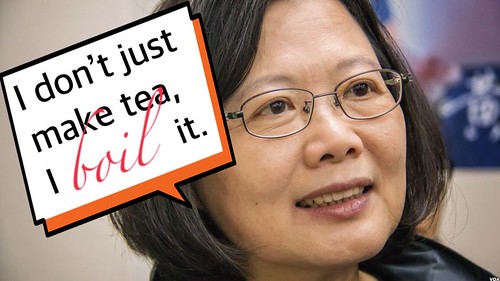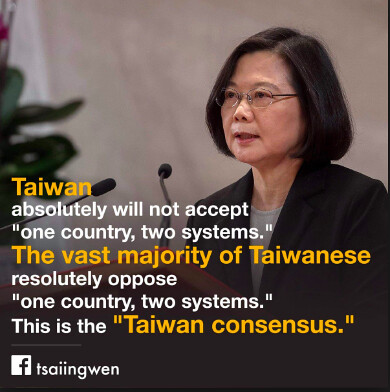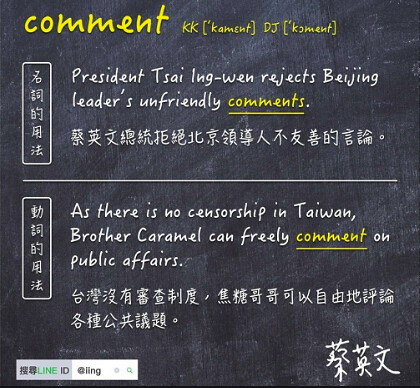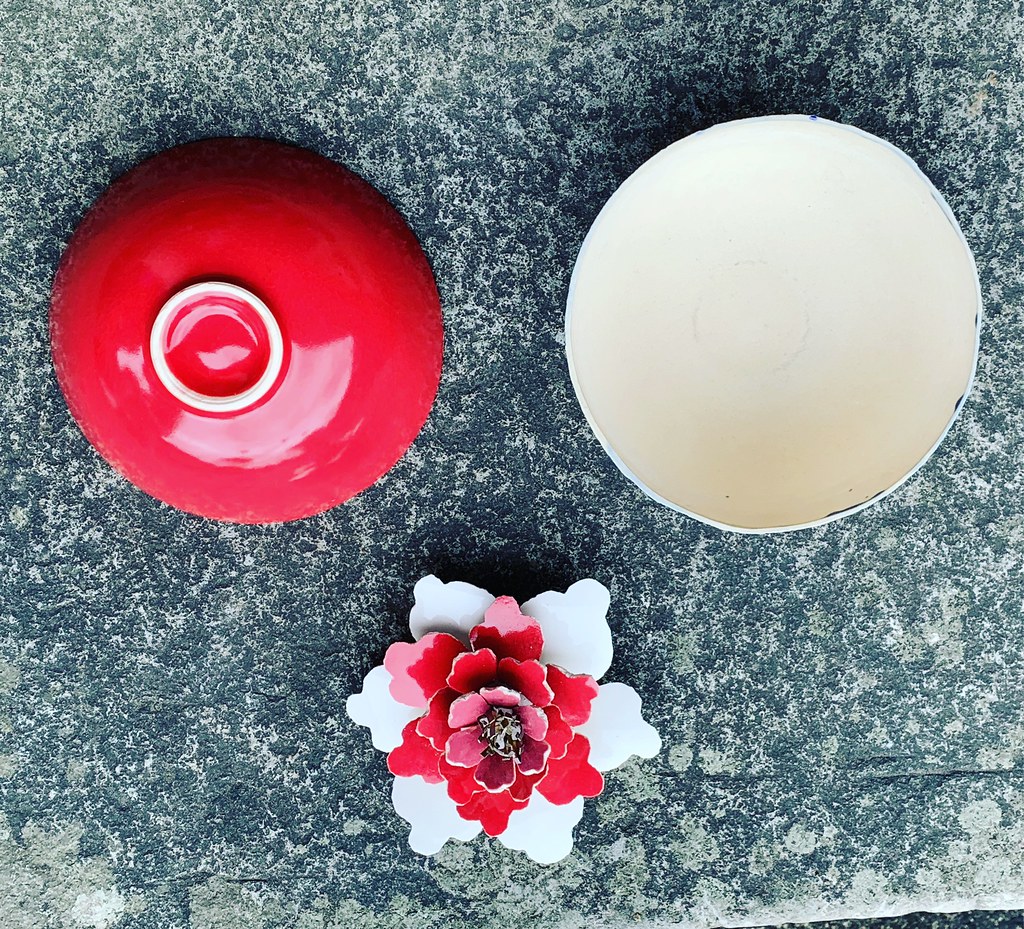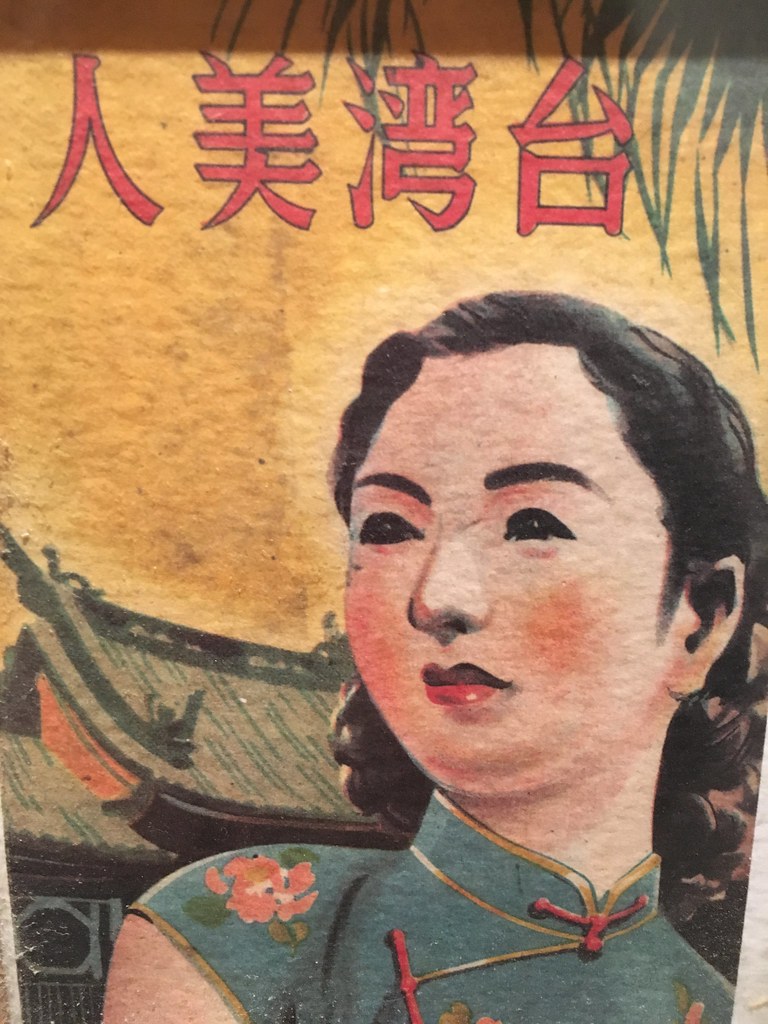
When New Party "candidate" Yang Shi-kuang went on about how Taiwan independence supporters were "women" and unificationists were "men" (and then continued, because of reasons, to bloviate on the supposed genders of other Taiwanese political figures vis-a-vis their stance on independence), I vacillated between feeling nothing at all, and like he was unknowingly serving up a compliment.
I won't bother with the notion that how you feel about Taiwan says anything at all about what's in your pants; that doesn't merit a response. In any case, he was referring to gender as a construct and semiotic representation or classification (not that he's smart enough to have realized this himself - he probably did think he was making a crude joke about genitals.) China as 'the masculine' and Taiwan (and its sovereignty) as 'the feminine'.
Anyway, this should offend me, but it doesn't. In its crass 'heheheh if u dont like china u r a dum wummin' form, it just doesn't mean anything. In its more symbolic sense, however, I've actually made an argument that seems similar on the surface but is actually completely different (because unlike this guy I'm not stupid), and I'm here to say this: what's so wrong with Taiwanese independence and Taiwan in general being symbolically 'feminine', and identifying with that regardless of your gender identity and biological sex? Why is it inherently a bad thing to be 'feminine', or desirable to be 'masculine'?
(It's not.)
Instead of retreading already-covered ground, here are a few points I made in Island of Women and its follow-up, From the Island of Women to #metoo:
This idea of China as masculine (and dominant) and Taiwan as feminine (and ignored or unimportant) isn't a new concept. In Taiwan's Imagined Geography, Emma Jinhua Teng devotes a whole chapter to conceptualizing Chinese thought (in the time period she covers, although it's just as true today) as "masculine" - Confucian, patriarchal, and often consciously so - and perceptions of Taiwan as "feminine". That is, an "Island of Women" where many indigenous tribes had matriarchal, matrilineal, uxorilocal practices and often had female chiefs. This was also a common conceptual device to link Chinese culture to being morally upright, powerful, and civilized, and Taiwan to being barbaric and - although Teng doesn't say this directly - weak....
Consider how China talks about itself: 5000 years, Confucian values, strong country desiring global hegemony. Now consider how Taiwan talks about itself - the beautiful island. In one of my favorite comics, China is male, the ROC is androgynous, and Formosa is a voluptuous woman. I will also point out something that struck me recently as I thought about the subtler themes in Shawna Yang Ryan's Green Island. While the protagonist's father (representing Taiwanese political ideology, including notions of freedom and sovereignty) was absent for a portion of the novel and never really recovered from his incarceration, her mother (representing the land of Taiwan, including home and family) was always there. It's not offhandedly that, as a young woman, that same mother quotes Du Fu, saying "國破山河在" - the country is broken, but the mountains and rivers remain.
It is not a great leap to see that, despite China's talk of two sides of one family "reuniting", in fact, it wants to be the domineering patriarch, forcing Taiwan into the role of feminine supplicant. It wants to be the controlling husband to Taiwan's obedient wife.
It doesn't take much to further leap to the realization that, if China is masculine and Taiwan is feminine, the West is treating them exactly as we treat the genders. We listen to China. We give them space...
And Taiwan? We treat her as we do women: we ask her to take up less space (by literally giving her less diplomatic space). We ask her to keep China calm, to bend and contort herself - whatever it takes to keep that man happy.
And:
Until just few centuries ago, the vast majority of Taiwanese did not have ancestral ties to China: the permanent population was entirely Austronesian. However, it was known to Chinese explorers. They would often refer to it not as the Beautiful Isle as the Portuguese did, but instead as the “Island of Women”, a name which served two purposes. First, it provided a shorthand description of their impression of Austronesian indigenous societies, where women typically enjoyed higher status – including leadership positions in both the religious and political spheres, matrilineal and matripotestal customs – a social structure that was entirely different from the Confucian, patriarchal Chinese cultural values of the explorers. It was also an insult, as it was common in China to associate femininity and matriarchy with backwardness and barbarism, and masculinity and patriarchy with advancement and civilization.
So I don't see why it's such a great leap to symbolically classify Taiwanese independence as 'feminine' and unificationism as 'masculine'. If anything, that's an insult to unificationism, not pro-independence sentiments. Think of it this way (and a small content warning here for rape and sexual violence): I can't find it online, but I have seen political art in Taiwan that depicted a female Formosan mountain dog, colored green, being raped by an angry male dog of a different breed, colored red. It wasn't self-deprecation - it was a howl of anger, fear and desperation. It was putting into images a symbolic truth that is difficult to put into words.
If pro-China forces want to claim that masculine mantle, I say they those are the connotations we should associate with it. They'v already got the gaslighting down pat, so they can have the patriarchy, the old order, the role of the oppressor. That's what they want anyway, isn't it? And that means we get to be the good guys (which is not to say that 'masculine' is always bad and 'feminine' is always good - but they sure seem to be leaning into all of the negative aspects of that symbolism). Not to get too Joseph Campbell on you because I'm not a huge fan, but if they want to be Darth Vader, fine. Vader seems powerful but he dies, and nobody likes him. We get to be
And what better Darth Vader than Xi Jinping, and what better Princess Leia than Tsai Ing-wen?
It might seem like I'm acquiescing to giving lots of power - I mean, the patriarchy is power - to the bad guys here, but I'm not. I'm giving them the role of the oppressor, a role they are willingly taking on. And the role of the oppressor, symbolically, is to be eventually defeated. That's how it works in all the best stories.
Of course, stories are stories and reality doesn't always deliver those pumped-up happy endings. We could lose. But we're living in a time when that's not a foregone conclusion. The world is turned upside down, and it remains upside down. These ideas of power, dominance and the patriarchy and the harm they have done to everyone else are taken more seriously. Being the scrappy 'rebels' can work in our favor (though we're not actually rebels - those of us who sympathize with Taiwan just want to maintain and formalize the sovereignty this country already has). The unificationists may be linking back to Confucian ideals of masculine power - cultivating land and civilization from terrifying 'female' jungle and 'savages' - but that story's out of fashion, and should remain so. It's patriarchal and stale.
So, you know, I don't care if you're male or female. I don't care what's in your pants. It's okay to sympathize with something that is conceptually and symbolically 'feminine' - it's not a bad thing to be 'female' or 'feminine', whether you are a person or a concept. Yang Whats-His-Name thought he was insulting Taiwan independence supporters by calling them 'women', which just reveals that he is a sexist person with a sexist, patriarchal mindset. It's not insulting to be called female, because being female isn't a bad thing.
And that means he is the oppressor, and his role in this story is to be defeated.



